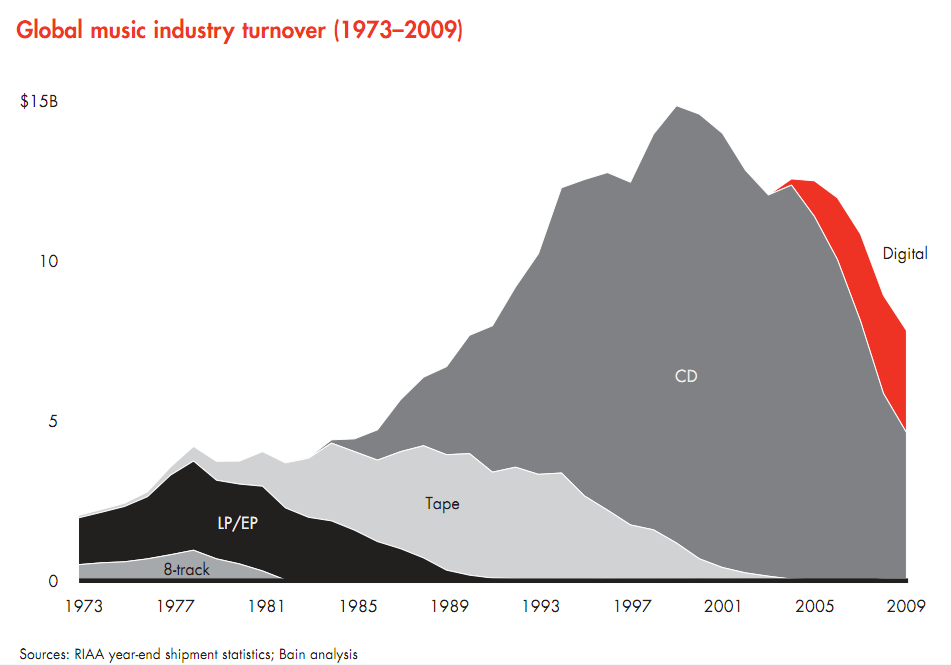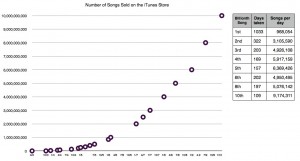This is the chart no industry wants to see:
The Motion Picture Association of America (MPAA) and Recording Industry Artists of America (RIAA) would have you believe this is the effect of piracy. But let’s dispel that right out of the gate: Digital music piracy has steadily declined for the past five years and is nearly half of where it was in 2005.
Is it just a coincidence that music theft began to decline at exactly the same time revenues fell off a cliff? I don’t think so.
In the Beginning…
 In the beginning, Publishers created the record and the CD. Now the Internet was formless and lifeless, darkness was over the surface of computer monitors and the Spirit of Tim Berners-Lee was hovering over the wires.
In the beginning, Publishers created the record and the CD. Now the Internet was formless and lifeless, darkness was over the surface of computer monitors and the Spirit of Tim Berners-Lee was hovering over the wires.
During this dark age before the Internet, music consumers had two choices; the single or album. Once cassettes and CDs took over, however, even that choice disappeared. Consumers frequently had to buy twelve songs they didn’t want in order to get the one they did. There wasn’t any other choice, so we sucked it up and (more often than not) bought the CD.
And Tim said, “Let there be a world wide web,” and there was a world wide web. Tim saw that it was good and he separated the interface from the data. Tim called the interface a “browser” and the data he called “hypertext.” And there was Netscape and there was Lycos – the Internet.
But it wasn’t only the Internet that led to digitization. Inexpensive computers with CD drives that could burn songs into a compact format were also required. Once consumers acquired a taste of freedom to separate the songs from the album, piracy was born. Napster came on the scene and sparked an explosion in digital theft. Although Napster was shut down relatively quickly, new services and technologies popped up in the never ending game of “Whack a Mole” between publishers and pirates.
Yet, around 2005 piracy started to decline and music sales began to fall off of a cliff. Hmm… Wha happa?
Let There Be Downloads
I remember clearly sitting in front of my computer in 2003, calling a friend over to show him the announcement of a new online store that would sell individual songs and let you download them straight to your iPod. “This is great! I’ll never by another album again!” I exclaimed. My friend looked at me and deadpanned, “The record companies will never let that happen.” Well, you know what happened. In fact, take a look at what happened right around 2005 (click on the image for full size):
Downloads exploded but revenues fell off a cliff. Consumers were liberated from having to buy stuff they didn’t want. Meanwhile, the MPAA and RIAA spent enormous time and effort battling the white elephant of digital piracy and started sending their customers to jail. They were caught in a business death spiral.
Newspapers and magazines are battling a similar mirage. They think that the enemy is bloggers who are stealing their content and giving it away for free. In reality, consumers want their content in tiny, hyper-relevant bites. But so far, publishers haven’t figured that out and continue to try to force-feed us the all-or-nothing options on a shiny new object.
Freedom!
 The chart at the beginning of this post is an illustration of what happens to an industry that has enslaved its customers when they are finally liberated. In his blog today, Seth Godin addressed the issue of “pricing power.” He suggested that there are two reasons why you aren’t getting paid what you think you’re worth:
The chart at the beginning of this post is an illustration of what happens to an industry that has enslaved its customers when they are finally liberated. In his blog today, Seth Godin addressed the issue of “pricing power.” He suggested that there are two reasons why you aren’t getting paid what you think you’re worth:
- People don’t know what you’re worth, or
- You’re not (currently) worth as much as you believe
Most businesses refuse to believe #2 could be true. If it’s not, you have a marketing problem.
If it is, you have bigger problem.


Trackbacks/Pingbacks